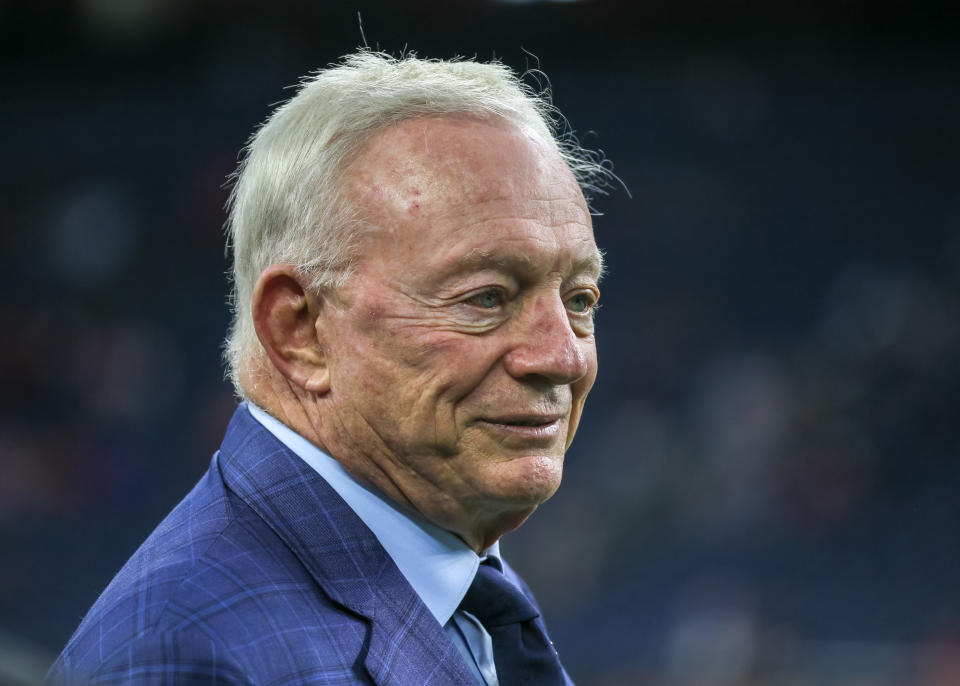Jerry Jones has never had a problem sharing his opinion, so why is he quiet following George Floyd's death?
It’s been almost two full weeks since the NFL circulated the first Roger Goodell statement responding to the death of George Floyd, three paragraphs that weren’t exactly strongly worded.
It’s been seven days since video of Goodell looking into a camera and declaring “black lives matter” and “we were wrong” was posted, a direct response to a video featuring 18 of the NFL’s highest-profile black players that demanded the league do more.
In between, we’ve seen a fair number of team owners attach their names to statements decrying systemic racism and announce actual steps they are taking or planning to take toward helping the problem.
The Tennessee Titans have a page on the team website with resources like Nashville-area black-owned business, community organizations like the Urban League, and even movie and book recommendations to learn more about becoming anti-racist along with owner Amy Adams Strunk’s declaration that, “Those who face racism need to be heard, and more importantly, understood by those who haven't listened before.”
Baltimore Ravens owner Steve Bisciotti and New England Patriots owner Robert Kraft, among others, have pledged money to grassroots organizations in their respective communities working toward equity and social and racial justice. Gayle Benson, who owns the NFL’s New Orleans Saints and NBA’s New Orleans Pelicans, formed an athlete leadership coalition that will actively push for reforms locally and nationally.
But over the last few days, many who follow the league have started to wonder: Where is Dallas Cowboys owner Jerry Jones?
Jones has never had a problem sharing his opinion before. He’s called the “shadow commissioner” because of the influence he wields as owner of the most valuable sports franchise on the planet. As the Cowboys’ general manager, he talks to media after nearly every Dallas game, win or lose, giving his unvarnished opinion of what just transpired. He has a weekly in-season appearance on a local sports radio station, his colorful colloquialisms often peppering his words. At league events like the scouting combine, Jones is never hard to find, his custom bus with the ubiquitous Cowboys star always nearby.
Since Floyd was killed in Minneapolis on May 25, however, the man who has never seemed at a loss for words is suddenly silent.
And his silence tells us everything we need to know.
The weeks since Floyd’s death and the growing wave of Americans willing to reckon with the country’s racial past and present, for now, seems genuine. There’s a sense that we’ll finally see real, structural change, from how police departments are structured and what they’re asked to do to realizing that the rot is so prevalent it counts as a municipal health emergency.
In the sports world, we’ve seen athletes and coaches and teams speaking up, going beyond words on paper. They’ve marched and advocated for the names of slavery advocates to be removed from college buildings and admitted to their own reckonings and wrongs, pledging to do better.

Even NASCAR, which counts exactly one black driver among its top tier racers and has long been seen as unfriendly toward black Americans on the track, in the pits and in the stands, banned the hateful Confederate flag this week from its tracks, in large part due to the pleas of that one black driver, Bubba Wallace.
Currently, 70 percent of players on the Cowboys’ roster are black, in line with the NFL at large.
Dallas pass rusher DeMarcus Lawrence has been outspoken on social media, pushing back on those who believe he has no right to talk about racism because he earns a certain amount of money as if zeroes on a paycheck have ever shielded African Americans from hatred, while also retweeting other players speaking their truth.
Dak Prescott pledged $1 million to improve police training and help address systemic racism through advocacy.
Dallas released a well-produced 2-minute video on social media last week, entitled “Protest to Progress,” using the same line the NFL has used in the past. It showed players, local police and civic leaders talking and emphasizing that it will take “all of us” to create change.
Jones was not in the video.
Lest we forget, in 2017 Jones threatened Cowboys players with benching if they knelt during the anthem, even though NFL rules did not prohibit it.
As Goodell has encouraged players to peacefully protest, as he promised to join them, as Texans head coach and de facto general manager Bill O’Brien said this week that he’s “all for” player kneeling — one of many who have apparently finally heard what players have been saying all along, that the gesture is not nor has it even been meant to disparage American military members and veterans — Jones is nowhere to be found.
Many of us have long believed that when it comes to racism, to be silent is to be complicit. At least some of those who cover the Cowboys and have been around Jones for a long time say that Jones is not racist.
If that’s indeed the case, there’s no better time than the present to speak up.
More from Yahoo Sports:

 Yahoo Finance
Yahoo Finance 
